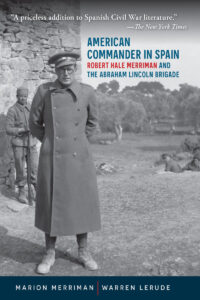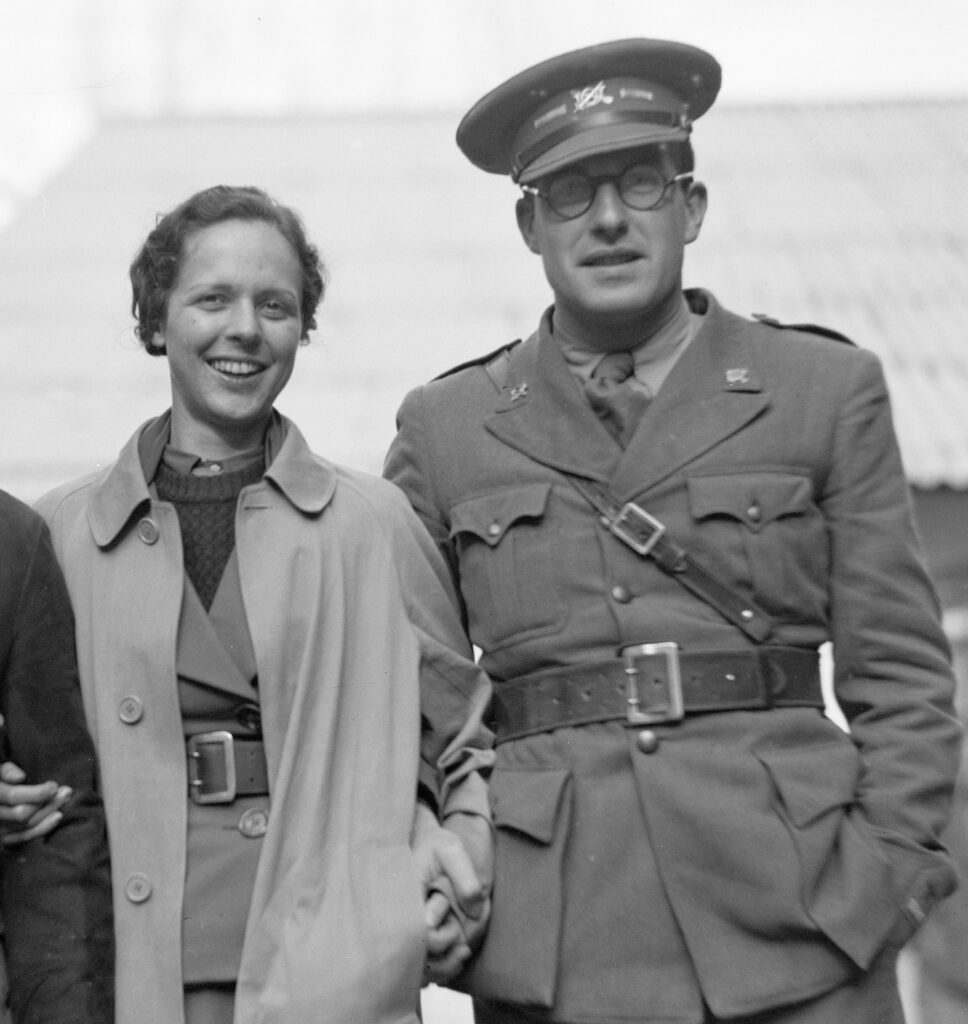Book Review: Marion Merriman’s Memoir Re-Issued
 American Commander in Spain: Robert Hale Merriman and the Abraham Lincoln Brigade, by Marion Merriman and Warren Lerude. Reno: University of Nevada Press, 2020. 328pp.
American Commander in Spain: Robert Hale Merriman and the Abraham Lincoln Brigade, by Marion Merriman and Warren Lerude. Reno: University of Nevada Press, 2020. 328pp.
Marion Merriman returned to Spain many decades after the Civil War ended to celebrate and preserve the memory of her husband Robert Hale Merriman, who died in the conflict. Her book American Commander in Spain, written together with Pulitzer-Prize winner Warren Lerude, first published in 1986, was reissued in paperback last year.
Merriman’s account provides a window into a foreign conflict that continues to mark and haunt the American consciousness eight decades later. An important, inspiring, and riveting story of a brave man furiously fighting in every sense for his ideals, it reveals much about courage and heroism—but also provokes questions about memory and loss.
From the start, the reader is struck by Robert Merriman’s utopian commitment to a better world. His career in agricultural economics clearly sprang from a concern for the plight of desperate Americans in the throes of the depression. In 1935 Merriman, then at UC Berkeley, traveled to Moscow on a research trip to study how the Soviet Union was addressing economic injustice and inequality. He eventually ended up in Spain to fight fascism. “Find better ways to make it a better world,” his professor and mentor at Berkeley, Dr. Cross, told his students at Cal. “This is your duty. There are solutions, but you must work hard to find them. The world must improve. Without you, it won’t happen. It’s that simple. You, the gifted ones with the brains and the energy, you make the difference.” How many students who major in economics today possess this core sense of vocation and conviction? Merriman was a special kind of man, but it was also a different time.
The book recounts the Merriman couple’s courtship and their life in a tiny and warm Berkeley apartment on Virginia Street. (Recently, it was endowed with a historical marker through the Berkeley Historical Plaque project.) Their year in Moscow is also retold at length. Merriman ultimately goes to Spain in 1936 not as a Communist, but as a man convinced that he must join the fight against fascism. His tall stature, handsome appearance, and level-headedness, as well as his friendly, fair, and balanced nature quickly ingratiate him to the men in the Abraham Lincoln Brigade. Before long, he takes a leadership role. Likable, good, committed, and brave, Merriman led troops in Jarama, Belchite and Brunete. (Reportedly Merriman was one of the primary inspirations for Ernest Hemingway’s hero Robert Jordan in For Whom the Bell Tolls.) The memoir recounts at length the experiences and battles of the 2,800 Americans who were willing to sacrifice their lives for the greater good, despite a lack of training or resources.
Marion, his wife, comes along for the ride, or that is how she sees it: first to Moscow, and then to the war. She clearly sees herself as the woman behind the man, though the facts of her life suggest a person of equal heroic valor and commitment. This book is not just about Robert, but about their journey together. After her husband is wounded, dedicates her life to fighting fascism through nursing, organizing, and later raising awareness in the United States.
The evident love and commitment of Bob and Marion to each other is striking. They wait until marriage to have sex. Though both attractive and young, neither strays in faithfulness, despite ample opportunities. They are beyond generous in their hospitality to friends, family, and strangers. They write many long letters to one another, and their love speaks to a kind of commitment that goes beyond passion, compatibility, and friendship.
Only at 70 was Marion able to face the pain of returning to Spain and writing Robert’s story. Her memoir is important for the values it uncovers. We all love to read accounts by and about Ernest Hemingway in the Spanish Civil War, despite his egocentrism and exaggeration, for the romantic, heroic, and manly Hollywood tint he puts on the conflict. While American Commander is in part an embodiment of a real-life heroic Hollywood leading man, there is constant pain, loss, and haunting memory behind the account as well. The experience of fighting for your life and your ideals and then slowly losing everything, including the person you love more than anything in the world, is palpable and personal.
In Jaime Camino’s film España otra vez (1969), David Foster, an Abraham Lincoln Brigade member, returns to Spain for a medical conference and visits many of his old haunts. A medical expert on pain, Foster’s conference talk explains how pain works in the human brain and how it can be stopped. Yet during his visit Foster is struck by another kind of pain, as visual flashback of the war lurk around every corner. After reuniting with many of his old friends and acquaintances, David finds himself in a state of absolute disconnect and alienation. His old friends, alone and sad, want to forget the past. “I never should have come back,” David tells his wife in the end. “You have to live each moment as it comes, you can’t go back to it.”
One can only guess what it cost Marion Merriman to go back in the 1980s. After the war she remarried, raised children, was an activist, and had a successful administrative career at Stanford University. Only in her senior years was she able to tell the story of her life with Robert. It is a story worth telling.
Katherine Stafford is an Assistant Professor of Spanish at Lafayette College in Easton Pennsylvania. She is the author of Narrating War in Peace: The Spanish Civil War in the Transition and Today (Palgrave 2015) as well as various academic articles on the Spanish Civil War and Francoism.













